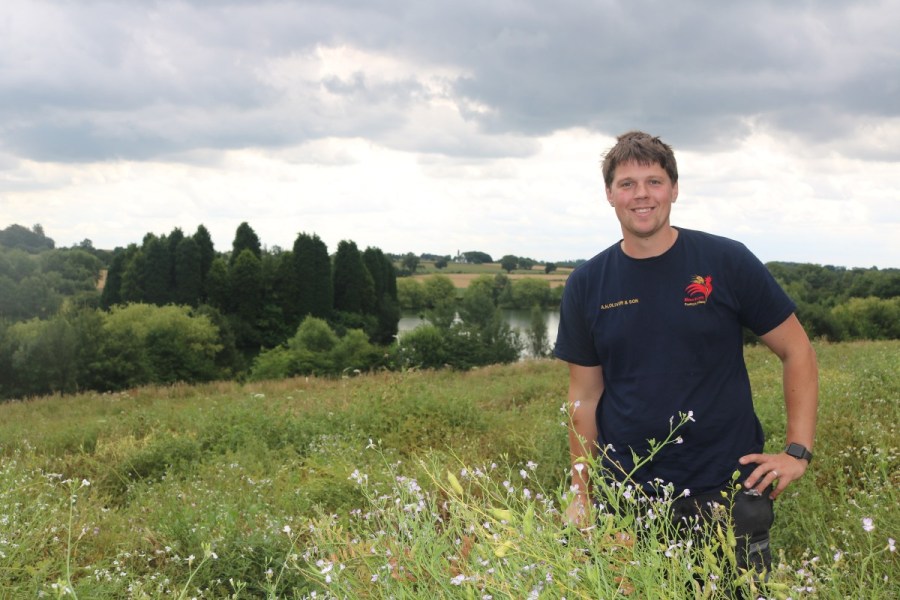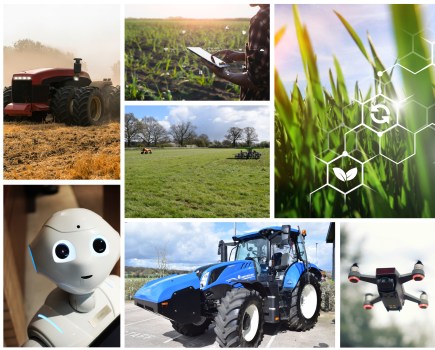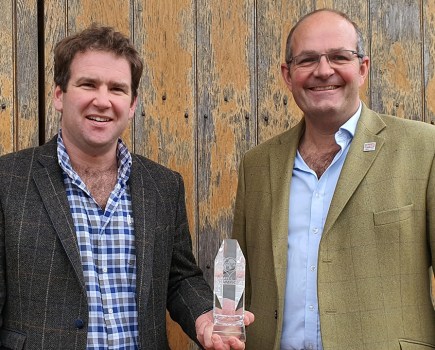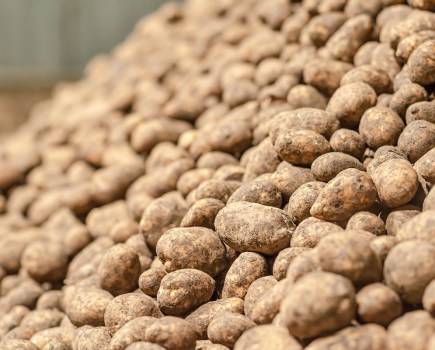Will Oliver has been responsible for some bold changes his family farm has made and has impressive results to show for them. CPM explores how the decisions were made that gave the business the confidence to change.
What we’re aiming for is a flexible arable system, guided by data, not dogma.
By Tom Allen-Stevens
The maize crop Will Oliver inspects towers above his head. But it’s not the biomass he’s concerned with. Will’s inspecting the development of the young cobs – this is grain maize, his second year of growing it, with 180ha across the farm, following a successful trial crop last year of 30ha.
“The gross margin on our grain maize last year was £1291/ha, while the oilseed rape suffered a deficit of £12.80/ha. That’s why we’re growing it,” he says.
“You also leave a layer of organic matter as well as deep roots in the field that are built back into the soil. It follows a cover crop that we graze with sheep, and although it’s a late harvest, damage to the soil is minimal, provided you’re careful. And it’s a fantastic crop for blackgrass control.
“Grown in this way, I think maize is very much undervalued for its carbon contribution, and it offsets a major import. The only thing to watch for is fusarium.”
The grain maize is one of a number of changes Will has introduced to the business, AH Oliver and Son, that he runs with his father, Alf, while brother Rory has just joined having returned from university. There’s 800ha of mainly clay loam soils across three farms in Leicestershire, with the site of the Battle of Bosworth on one of them. A well diversified and integrated business, there’s 9300m² of industrial units and a glamping site.
At the heart of the business lies a state-of-the-art poultry unit – a new build and new direction for the family business Will researched and project managed when he joined. Arriving at the 190,000-broiler unit, and after passing through the obligatory biosecurity checks, you’re struck by the calm serenity and sense of order at this highly productive farm site.
Will throws open the door to the eight geothermal pumps that hum as they draw heat from the ground to service the unit. “We keep the temperature at a constant 26°C through underfloor heating. That’s not only efficient, but it keeps the chicken litter dry – good for flock health and easier to use and store on the land. As well as these heat pumps, we have a 250kW solar array on the roof – there are LPG gas tanks, but we only occasionally need them. We put 600t of the farm’s arable crops through here, with the feed ration computer-controlled and automated throughout the sheds.”
On the way out, you pass the weighbridge. “I take every load of the 1950t/yr of litter we produce over this and get a regular analysis so we know exactly what we’re putting back on the land,” he points out. “It’s applied to the crop in the spring, supplemented by inorganic applications. These are determined by regular tissue testing I carry out throughout the season. I hope that what we’re achieving is good nitrogen use efficiency.”
It’s Will’s grasp of the figures that gives you the confidence he’s probably right. You ask for his average yields and he comes back with costs of production – £56/t for wheat, £29/t for maize and £122/t for beans. Along with the poultry litter, which delivers an equivalent of £269/ha, digestate is brought in from the nearby Biogen AD unit at Merevale, worth £150/ha. Overall, the new circular system has reduced conventional N applications by 40%, while no phosphate, potash or sulphur applications have been necessary in recent years.
So how does he keep track of the figures? “I’m actually a big fan of Gatekeeper. It annoys me immensely, but it holds all my data and I use it enough to know how to bring together all the costings and generate good application maps,” says Will. It’s one of a number of platforms he uses – data is exported to Yagro for multi-year analysis and field-level performance, for instance. Rhiza is used for soil-sampling zones and he flashes up long-term yield maps that show him precisely which parts of his fields consistently underperform.
“Once you have a system set up right, it doesn’t take any time to manage it to get the data you need. All of our software, licensing and telematics costs come to £12.90/ha, which sounds excessive, but it’s invaluable in terms of having the data you need to make an informed decision and justify a change. The alternative would be to just carry on the way we’ve always done it – it’s very easy to get trapped in your own bubble on a family farm,” points out Will, who carries out all the farm’s agronomy, makes its purchasing decisions, and has plans to apply for a Nuffield Farming Scholarship.
So what about cultivations? “We actually moved away from direct drilling in 2000 – Dad had a John Deere 740A drill that underpinned a system he’d operated for around 10-12 years. The cost savings were great, but the land got sad and it was clear that direct drilling wasn’t helping. We’re lucky that everything here is well drained, so we’ve moved to a system of careful cultivations.”
Historically, the business had included dairy and beef, but exited livestock enterprises after suffering heavy losses as a result of foot-and-mouth in the early 2000s. Meanwhile, the buildings had more earning potential as industrial, so were repurposed. While profitability markedly improved, the rotation relied heavily on wheat and OSR, while Will could see that putting a sustainable livestock input back into the arable system was essential for its long-term prosperity.
The system appears to be working – soil organic matter levels across the arable soils have improved from 2.6% in 2015 to 3.5% in 2020. But Will insists he’s not pursuing a regenerative agriculture approach. “I think some of the exponents of this are the vegans of the farming world. What we’re aiming for is a flexible arable system, guided by data, not dogma.”
Subsoiling and mole-ploughing are generally determined by Will’s spade – his constant companion – while an 8m Väderstad Carrier is the main cultivation tool. “We carry out common-sense trafficking – it’s not a strict controlled-trafficking system. The New Holland CR9.90 combine has a header width of 12m, while we’ve also recently purchased a 12m Horsch Sprinter drill and keep grain trailers and other trafficking at the field edge. But it’s often useful to put the Carrier through on a diagonal, for example.
“You can see from the yield maps that headlands suffer, though, so these are clearly an area for improvement.”
Will has been monitoring tyre pressures and is meticulous that choice of tyres and the pressure they run at are matched to the job in hand – not just for the mainline tractors, but for trailers and even the row-crop wheels on the sprayer, for example.
“It’s a challenge for us as our farmed area extends to 26 miles from one end to the other. So there’s a lot of road travel and we’re conscious that, depending on tyre type, the correct pressure for road use is usually higher than you should run in the field. It means we have a telehandler at each unit, for example, which sounds over-mechanised, but makes sense when you take everything into account.”
Will’s looking into how tyre technology can bring solutions and help improve the arable system further. But he points out he’s already made some bold decisions that have worked out well for the farming business. “I often wonder whether we should carry out on-farm trials, but with the right data systems the whole farm becomes a trial,” he says.
“It means you can try something new, like grain maize, and monitor the results. Then if it works, you take the bull by the horns and roll it out across the farm. It brings you to the point where you can justify not doing something and know you’re not compromising the business’ long-term prospects, nor the profitability of the crop in front of you,” concludes Will.
What makes Will Oliver a Climate Change Champion?
Innovative ideas
Will has introduced some bold changes, but has the data to justify the decisions the business has taken. It’s his mastery of the data, along with the impressive results he can show, that stand out.
Productivity push
The business has achieved massive reductions in synthetic inputs through use of chicken litter and digestate, and has moved to a more sustainable rotation. Both agronomic and financial performance are monitored closely and yielding good results, in terms of cost per tonne.
Cultivation care
Will takes stock of the principles of good practice, but takes a flexible approach to cultivations and trafficking, which is carefully monitored. Despite moving away from direct drilling, the farm’s soil organic matter has increased considerably.
Bio-based boldness
Geothermal heat pumps and solar panels ensure the poultry unit uses minimal non-renewable energy.
New technology drives a path towards net zero
The quest for net zero is an essential aspect of progressive farming and it’s fundamental to BKT’s approach to tyre technology, says Yuri D’Antilio, field engineer with BKT Europe. The company has been working with one of CPM’s Climate Change Champions to help maximise the carbon benefits of tyre technology.
“Choosing the right tyre for each application on farm is very important for reducing emissions. Essentially, using the correct tyre increases efficiency and also makes it last longer. And it also performs better in terms of traction and fuel consumption,” he notes.
A key feature of BKT’s Agrimax Force range is IF technology, continues Yuri. These tyres are made to have a wider tyre footprint to achieve a high flotation capacity and a uniform distribution of heavy loads at low inflation pressures. This means less impact of the machinery on the soil, he maintains.
“It’s a product that’s suitable for high torque, high power tractors – more than 250hp. What’s more, it has good performance at road speeds up to 65km/h without the need to adjust the tyre pressure, and it’s a tyre that self-cleans – essential for those who move from the field to the road.”
Agrimax Force is designed to guarantee a life cycle that is 10% longer than the standard equivalent solutions, while the flexibility the IF technology brings to the tyre casing enhances driver comfort, he adds.
A further advance is new VF technology, developed using a procedure to measure the 3D footprint of a tyre to see how it creates soil compaction and implemented in the Agrimax V-Flecto range. A set of these have just been fitted to the New Holland T6.180 tractor by John Hawkins, one of CPM’s 2020 Climate Change Champions, who farms at Bagber Farm near Blandford Forum, Dorset.
“With most of the farm in stewardship schemes, we direct drill spring barley straight into a cover of a thick legume mix, aiming to preserve as much carbon in the soil as we can. This takes place as early as February in one pass with a front-mounted topper,” he explains.
“At that time of year, the weakest link in the system is compaction caused by the factory-fitted standard tyres. The V-Flecto has a 10% wider tread so a greater footprint means less soil compaction, but it can take the considerable weight of the mounted implements at a low inflation pressure.”
Finally, there’s the RideMax IT, specially developed for transport application and also for cold weather conditions, says Yuri. “Its pattern design follows the typical agricultural tread but has been modified to match requirements of stability and low wear rate on the road, thanks also to a special compound, and this is a way to ensure the tyre is more efficient,” he adds.
“We feel we’ve made bold moves with our tyre technology, carefully designed to increase the performance and efficiency for farmers. It’s this same progressive thinking Will Oliver shows, and that’s helped him drive forward the family farm, which is why BKT is pleased to support Will’s quest to be Climate Change Champion 2021,” says Yuri.
Climate Change Champions
UK Farming has set itself the challenging target of Net Zero emissions by 2040. Although led by the NFU, it will take the entire industry, working together in a partnership approach to meet this ambitious goal.
But there are individual growers, thought leaders who have already started on this journey. They have the ideas, the progressive outlook and the determination to shape positive change. CPM has teamed up with leading agricultural suppliers who have a credible Net Zero aspiration to identify these individuals and bring them into the top-level discussion about how farming can position itself as the solution to climate change.
CPM would like to thank our sponsors: Agrii, BASF, BKT, CF Fertilisers, KWS, Interagro, Lloyds Bank, Small Robot Company.




